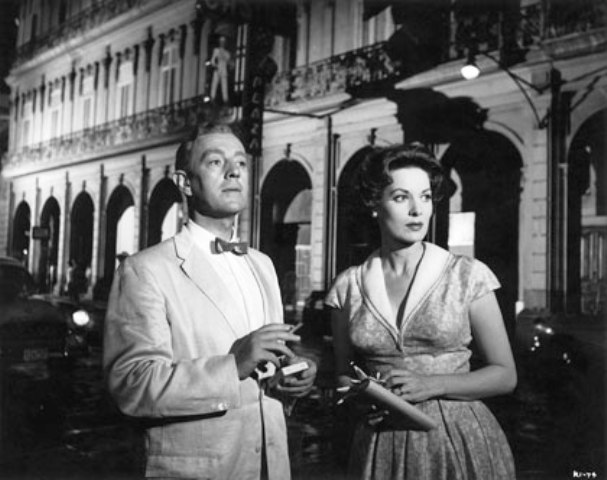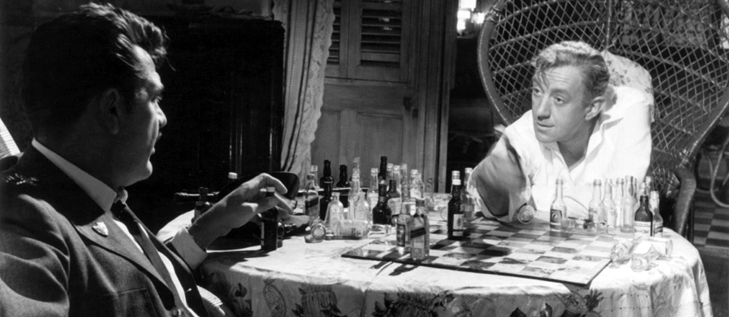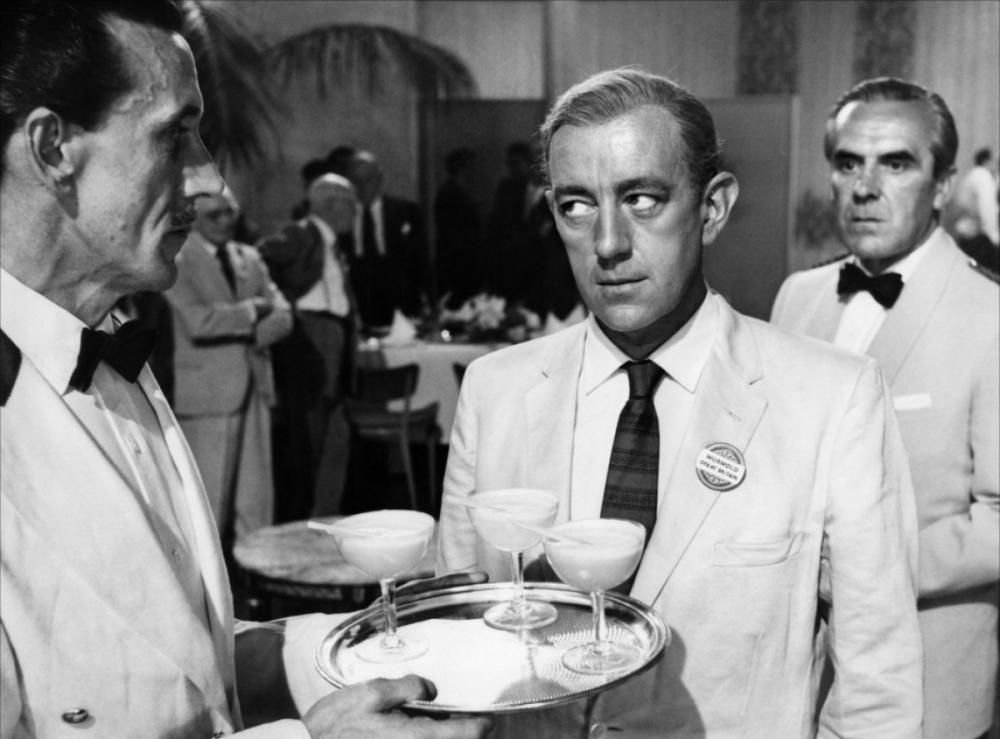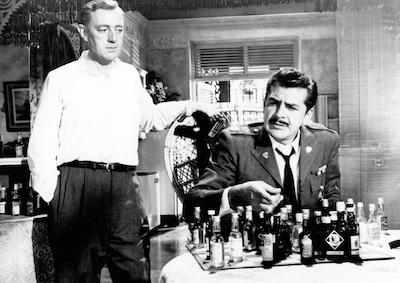You tend to forget how dark “Our Man in Havana” is.
Carol Reed’s film of Graham Greene’s “comic” spy novel is no “Ugly American,” to be sure, and was never quite as sadistic as the early James Bond movies it was compared to as they came out. But “quite” carries a lot of baggage in that sentence. And the memory is colored by all the versions of “civilian recruited as spy” films inspired by it, especially the screen version of John LeCarre’s homage to “Havana,” “The Tailor of Panama.”
The casting of Alec Guinness, Noel Coward, Ernie Kovacs, Burl Ives, Maureen O’Hara, Ralph Richardson and Noel Coward at his drollest certainly lend “Havana” a comical air that sits lighter on the memory than the murders and sinister turn things take.
Spycraft and its misuse is all jaunty and jolly, Guinness properly hapless, Kovacs comically lecherous and menacing and Coward a dapper parody of the overdressed undercover agent, strutting about with cane and hat, often accompanied by a street band (The Buena Vista Social Club in their youth?).
And then the guns, the poison and the “accidents” crop up and the “innocent fun” curdles.
Guinness plays the owner of a vacuum cleaner shop in pre-Castro (the film was finished just as Fidel was seizing power) Havana who faces an absurd barrage of questions from the well-turned-out gentleman (Coward) who shows up in his shop, a fellow countryman who wants something.
No, high end vacuums aren’t in much demand, even among the better off.
“There’s not much electrical power since ‘the troubles’ began.”
Wormold’s a single father whose teen daughter (Jo Morrow) has only known Havana.
“Girls grow up early in the tropics,” Wormold’s old German drinking buddy (Ives) counsels.
“Yes, and she’s even grown an American accent.”
That makes Wormold his upper class customer’s ideal recruit. He’s broke, British, “a patriot” and WWII vet. His daughter’s in Catholic school in a Third World country and he wants a better future for her than Cuba promises — Europe, gentility.
And she’s fallen under the gaze of the sinister, high-living and ruthless police captain (Kovacs, just dripping with comic menace), a man more than twice her age.
Wormold’s “I don’t see how I can possibly be of any use to you” turns to “OK.” He’ll take the retainer, keep an eye and an ear out, “recruit” others to gather intelligence for him.
That’s the grand joke of “Our Man in Havana,” the way the capitalist military-industrial-espionage complex incentivizes crisis, exaggeration and lies. There’s more money in bonuses if Wormold recruits others, more money still if he stumbles across “secret” construction (this was filmed years before the Cuban Missile Crisis). A talented sketch artist like Wormold can “invent” agents and collect their pay, and when the need arises, draw pictures of this unusual facility “in the mountains.”
The film’s funniest acting is Coward realizing that what his over-impressed spy chief (a whimsical and tactless Richardson) says back in London is true of that “facility.”
“Looks a lot like a vacuum cleaner.”
It turns out Wormold is taking advice from his too-understanding pal, Dr. Hasselbacher. Ives was a cute and cuddly folk singer/actor who played some great heavies in the ’50s.
“All you need (to do this spying) is a little imagination,” the good doctor, a researcher in how cheese ages, purrs. “As long as you ‘invent,’ you do no harm.”
And then the kicker — “They don’t deserve the truth.”
It all goes pear-shaped, as the Brits like to say, when people back in Britain, and those who compete with them in the Spy Game of Nations, start taking Wormold’s flights of fancy seriously.
Reed, who knew his way around this sort of skullduggery thanks to “The Third Man,” keeps the threat of violence in the background of this tropically-bright, with shade and shadows, black and white masterpiece (Oswald Morris was the director of photography).
But what’s going on in the foreground can be a hoot. Casting Coward, one of the models for his friend Ian Fleming’s James Bond, makes the second “recruiting” scene a raised-eyebrow giggle. They meet in a bar.
“Where is the ‘gents?’ Good. You go in, and I’ll follow.”
Guinness’s Wormold isn’t guileless enough to fall for that, following Britain’s most famous if not exactly “out” homosexual into a men’s room.
Well, what’s the problem? “You’re an Englishman, aren’t you?”
John Wayne’s favorite leading lady O’Hara shows up unannounced as an assigned “secretary” to help Wormold run his (imaginary) spy ring, and maybe protect his daughter from creepy Captain Segura.
As the “chief” back in Blighty sputters on in delight about the intel from “our man in Havana,” we see how even the limited exposure to this double life has turned Guinness’s Wormold into a survivor, even as he’s blithely told of a plan to kill him and given cursory instructions about how that might happen, and the bare basics of avoiding being murdered.
Greene was a novelist the world was ever-so-reluctant to take seriously, and that carried over to his film adaptations as well. But the writer who scripted Reed’s other masterpiece, “The Third Man,” and his director came as close to perfection as movies come with this finely polished (and recently restored) gem.
The jokes are sly and winking and put the amusingly “phobic” in homophobic. Yes, Wormold’s recruited in a men’s room. Yes, one learns to recruit by imitation. But talking a Latin gent into the toilet with you isn’t going to be easy.
The Havana locations, like the post-war Vienna of “Third Man,” seem preserved in amber, a perfect snapshot of Cuba just after Castro took over, before the whole Cold War turn to Russia, U.S. sanctions, Bay of Pigs/Missile Crisis set in.
And Guinness, in the midst of his “Bridge on the River Kwai” turn from comedy to drama well underway, gives us a leading man who is very much the reactor, accepting much at face value, a character who turns darker still as he perhaps starts to suspect that his daquiri (listen to how he pronounces it) drinking buddy might not be a “doctor” after all.
A timeless time capsule like “Our Man in Havana,” on the page and on the screen, remains a sobering and comically cynical lesson in the affairs of state reaching down into the affairs of tiny, insignificant men and women. And Greene, Reed and their couldn’t-be-better cast beautifully capture the way each player hilariously — and lethally — misuses and misjudges the other.
Rating: “approved” (TV-PG, violence)
Cast: Alec Guinness, Maureen O’Hara, Ernie Kovacs, Burl Ives, Ralph Richardson and Noel Coward
Credits: Directed by Carol Reed, scripted by Graham Greene, based on his novel. A Columbia release, on Tubi, Amazon, other streamers
Running time: 1:51







